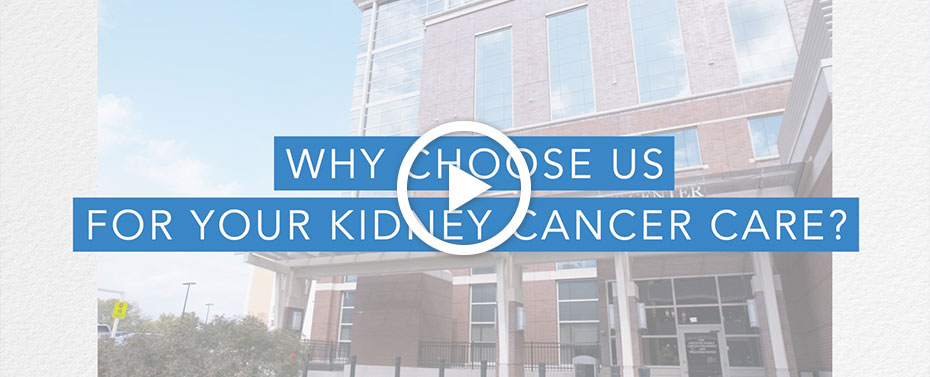Kidney Cancer
Your kidneys are two bean-shaped organs that filter waste and fluid from your blood. Kidney cancer (also called renal cancer) arises when abnormal cells grow in the kidneys.
There are three types of kidney cancer:
- Renal cell carcinoma is the most common type. It develops in the lining of tubes within the kidney. This type accounts for about 90 percent of kidney cancers.
- Transitional cell cancer arises in the cells at the center of the kidney.
- Wilms Tumor is a type of kidney cancer that affects children.
When detected early, tumors are generally small and contained within the kidney. In more advanced cases, tumors can spread beyond the kidney and into other areas of the body.
Regardless of your diagnosis, the kidney cancer team at Englewood Health offers effective treatments to help you heal.
We are able to offer patients all the surgical and nonsurgical options for kidney cancer. We offer both open and laparoscopic/robotic surgery. Robotic surgery helps improve pain and recovery from surgery. When appropriate, we offer partial nephrectomy, where we remove the tumor in the kidney, but save the rest of the kidney.
Dr. Maz Ganat, Chief of Urology
Why Choose Englewood Health for Kidney Cancer Care?
At The Lefcourt Family Cancer Treatment and Wellness Center at Englewood Health, you receive world-class care at a convenient, patient-focused, community hospital. Our urologic oncology team specializes in advanced therapies for kidney cancer. When you come to Englewood Health, you benefit from:
- Expertise: Your care team includes board-certified and fellowship-trained doctors who specialize in treating kidney cancer.
- Team approach: Our urologists work closely with radiation oncologists and medical oncologists. Together, they create the most effective treatment plan for each patient.
- Precise diagnostic techniques: We use the most advanced methods to accurately detect tumors.
- Advanced treatments: Our skilled team uses a variety of techniques to treat kidney cancer, depending on each patient’s needs. Treatments include active surveillance, cryotherapy, robotic surgery, and immunotherapy.
- Genetic testing: If you have a family history of kidney cancer, our genetic counselors can screen you and your relatives. They’ll check for gene mutations that increase your risk and need for more frequent screening.
- Clinical trials: We offer access to leading-edge research studies on kidney cancer treatments.
- 24/7 patient support: Our patient navigators help you coordinate care and communicate with your health care team. Our nurse practitioners are available around the clock, anytime you have urgent questions or concerns.
Kidney Cancer Risk Factors
A risk factor is anything that increases your chances of being diagnosed with kidney cancer. While your doctor may not be able to pinpoint a cause, several factors can contribute to your risk for the disease.
Risk factors out of your control
- Being male
- Older age (kidney cancer is rare in people under age 45)
- Being African American
- Having advanced kidney disease
- Having a family history of kidney cancer
- Carrying inherited genetic mutations, such as von Hippel-Lindau disease or hereditary papillary renal cell carcinoma
Risk factors you can change, treat, or control
- Smoking
- Obesity
- High blood pressure
- Misusing certain pain medications
Kidney Cancer Symptoms
Sometimes, a tumor can grow in your kidney without causing any noticeable symptoms. Symptoms that may indicate kidney cancer include:
- Blood in your urine
- A lump in your abdomen
- Loss of appetite
- Unexplained, sudden weight loss
- Feeling chronically fatigued
If you experience any of these symptoms, consult with a urologist. Your doctor will perform the appropriate tests to determine if you have kidney cancer.
Support Services for Kidney Cancer
Cancer treatment can be emotionally and physically difficult. We understand these challenges, and are here to help. The kidney cancer specialists at The Lefcourt Family Cancer Treatment and Wellness Center at Englewood Health work closely with our patient support programs. Together, we help you maintain your quality of life throughout cancer treatment.
Genetic Counseling
If you have family members who’ve had kidney cancer, you could be at higher risk for the disease. Certain inherited gene mutations, such as von Hippel-Lindau disease, can put you at risk. If your doctor suspects a genetic factor, we offer genetic counseling through our risk-assessment program.
Integrative Medicine
To help you cope with the stress of cancer treatment, we provide access to a variety of integrative medicine treatments. The specialists at the Graf Center for Integrative Medicine offer evidence-based complementary therapies such as acupuncture, meditation, massage, and yoga.
Nutrition Counseling
Proper nutrition is essential to help you stay strong throughout your kidney cancer treatment. Our registered dietitians help you determine the best diet to maximize your health and promote healing.
Palliative Medicine
Some kidney cancer treatments can cause unpleasant side effects. Our palliative medicine specialists help you manage these symptoms so you can continue your treatment more comfortably.
Patient Navigators
From the first time you come to Englewood Health, our patient navigators are here to assist you. Your patient navigator is available to help:
- Answer questions about your kidney cancer diagnosis and treatment options
- Schedule your appointments
- You communicate easily with your health care team
- Provide emotional support
- Connect you with community resources outside Englewood Health
Your Kidney Cancer Treatment Team
Kidney cancer can be complex, but we have the expertise to handle even the most difficult cases. Our team meets regularly to discuss each patient’s treatment and determine the most effective, personalized approach.
Our urologic cancer team includes specialists from a variety of disciplines. We all work together in one convenient location to make it easy for you to access all your doctors in a single visit. Your care team may include:
- Urologists, who use their knowledge of the urinary tract to help plan treatment
- Urologic oncologists, who specialize in diagnosing and treating kidney cancer
- Medical oncologists, who manage kidney cancer using drug therapies
- Radiation oncologists, who plan and perform radiation therapy


